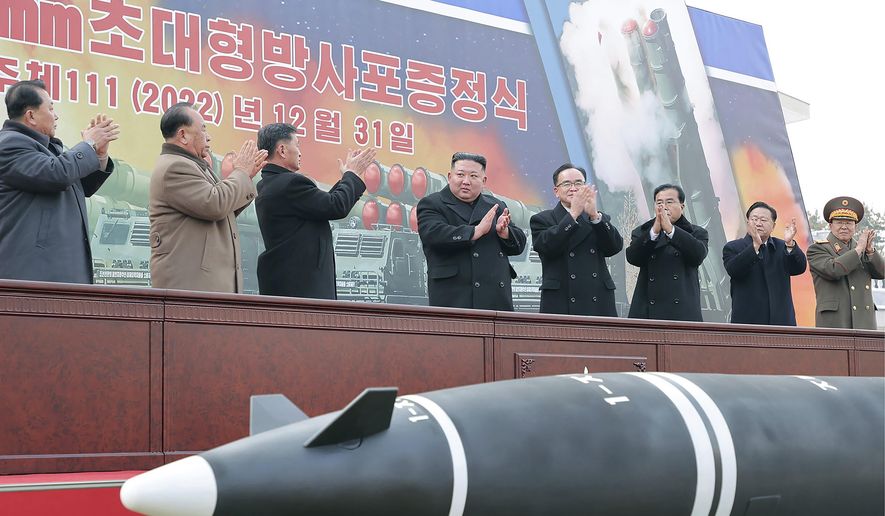The days of trying to “negotiate away” North Korea’s nuclear weapons program through diplomacy alone are over, former American ambassador to South Korea and retired Adm. Harry Harris said Tuesday, arguing that the U.S. and its Pacific allies must “up our combined game” in the face of growing threats from Pyongyang.
Speaking at “The Washington Brief,” a monthly forum hosted by The Washington Times Foundation, Adm. Harris said it is becoming increasingly clear North Korean leader Kim Jong-un has no intention of abandoning his nuclear programs despite years of diplomatic and economic pressure from the U.S. throughout administrations of both parties. His comments come just days after North Korea fired three short-range ballistic missiles off of its eastern coast and Mr. Kim spoke of an “exponential” expansion of his nation’s nuclear arsenal in the coming year.
The Biden administration and America’s Pacific allies fear that Mr. Kim may soon order another nuclear weapons test, which would be the country’s first since 2017.
Adm. Harris, the former head of U.S. Indo-Pacific Command, said that threat must be taken seriously.
“Why is North Korea … a challenge for the entire world? The answer is simple: Kim Jong-un’s missiles point in every direction,” he said. “The North’s unrelenting pursuit of nuclear weapons and the means to deliver them, and its unmitigated aggression toward the South and to the United States should concern us all.”
“I believe our heretofore U.S. policy goal of negotiating away North Korea’s nuclear program has reached its useful end,” Adm. Harris continued. “We must up our combined game. Deterrence by appeasement is not deterrence at all.”
SEE ALSO: Biden contradicts South Korean leader over joint nuclear exercises
The use of direct diplomacy with Mr. Kim reached its peak during the Trump administration, when then-President Trump held three unprecedented in-person meetings with the North Korean leader, including a historic joint visit to the Demilitarized Zone. But those talks failed to produce an agreement to end Pyongyang’s nuclear program or ease U.S.-backed sanctions on the North’s economy. Mr. Kim has steadily since ramped up his provocations while ignoring all diplomatic overtures from the Biden administration.
Last year alone, for example, North Korea carried out more than 70 ballistic-missile launches.
Specialists say any remaining hope of using diplomacy alone to slow Pyongyang’s nuclear program and halt its missile launches is quickly evaporating.
“Another disappointment for me from the last year was the fact that the United States and South Korea failed to entice, or compel … North Korea to return to the denuclearization talks,” Alexandre Mansourov, professor at Georgetown University’s Center for Security Studies, said at Tuesday’s event, which was moderated by former CIA official and longtime U.S. diplomatic adviser Joseph DeTrani.
“The way it looks to me now, diplomacy is dead,” Mr. Mansourov said. “I don’t see any prospects for the resumption of the six-party talks, to be honest, and any other initiatives.”
The six-party talks were multilateral negotiations involving the U.S., South Korea, North Korea, Japan, Russia and China. The initiative ended more than a decade ago.
SEE ALSO: China’s nukes use U.S. technology
But Pyongyang’s missile tests aren’t the only cause for concern on the Korean Peninsula. North Korean drones have also crossed over the DMZ and into South Korea in recent weeks, sparking fears that direct conflict between the two nations is inching closer.
Adm. Harris said the U.S. and South Korea must ramp up defensive systems to counter such uncrewed craft.
“Any drone warfare systems have to be in place in [South] Korea,” he said. “We clearly need to have them there, and the rules of engagement need to be discussed and war-gamed so the commanders on the ground at the tactical level know how to respond and not have to seek permissions, which could take hours, if not days, to get. And by then it’s too late.”
Even as the U.S. and South Korea work together to counter Pyongyang, confusion emerged this week over whether the nations may hold joint nuclear exercises. South Korean President Yoon Suk-yeol reportedly said earlier this week that such drills are under discussion.
President Biden shot down that idea Monday, offering a one-word answer when asked by reporters whether the U.S. was weighing joint nuclear exercises with Seoul. “No,” Mr. Biden said.
A spokesman for Mr. Yoon said the president’s words had been misinterpreted and said that instead of exercises the two allies are “discussing information-sharing, joint planning and joint execution plans regarding the operation of U.S. nuclear assets, in order to counter North Korea’s nuclear threats.”
• Ben Wolfgang can be reached at bwolfgang@washingtontimes.com.




Please read our comment policy before commenting.